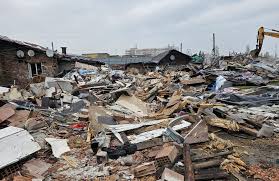Bulgaria bulldozes Roma enclave in capital, ignoring ECHR ruling

Sofia: Authorities started flattening illegally-built Roma homes in a Sofia neighbourhood despite a European Court of Human Rights ruling, which said demolition should not proceed until a legal challenge is resolved.
Roma families in Bulgaria’s capital face homelessness after excavators on Tuesday began demolishing houses in the Zaharna Fabrika area of the city, with police and a water cannon on hand to curb possible unrest.
The demolitions went ahead despite a European Court of Human Rights, ECHR ruling from April 11, which told the government not to “proceed with the demolition of the homes of the applicants until further notice” – until a law case is settled concerning 14 citizens living in the neighbourhood, who have now lost their homes.
BIRN obtained access to documents on the case, Ilieva and others vs Bulgaria, from the Bulgarian Helsinki Committee’s Legal Defence Programme, confirming the interim ruling.
“What is shocking is not only the lack of any humanity in this deed but also the arrogant violation of international law, the likes of which we have never witnessed before,” the Committee said on Tuesday.
The decision to demolish the illegally built houses dates from 2016 and is based on Bulgaria’s Spatial Planning Act. According to public data, the locals were notified.
On April 7, a new announcement alerted locals that definitive actions would go ahead. The document said the buildings “are dangerous to the health and life of citizens, are unfit for use, are in danger of collapsing and cannot be strengthened and repaired” – with planned activities focusing on “clearing the site of waste and thereby restoring the surrounding area”.
The Ilinden district of Sofia Municipality, in which the Zaharna Fabrika neighbourhood lies, told BIRN that in 2016 a total of 143 houses were deemed illegal, but that over the years some had been gradually demolished and the current number cannot be specified. “We’re at the last phase, and soon the process will be completed,” it said.
According to Bulgarian National Radio, seven houses were demolished on Tuesday morning, with 60 in total due to be flattened.
The authorities’ actions have sparked a rift between local mayors in the media. Emil Branchevski, mayor of the Ilinden district, said there were possible plans to rehouse the families in the city’s Botunetz neighbourhood.
However, Botunetz Mayor Lilia Donkova on Tuesday denied any such a move could go ahead. “Simply transferring a problem from one neighbourhood to another doesn’t work,” she said.
The municipality did not respond to questions on whether the families facing homelessness will be accommodated elsewhere.
Over the years, the Zaharna fabrika area has been associated with various social problems, with locals often complaining about homelessness, criminality and pollution. Locals have protested about the poor living conditions and have called for the Roma enclave to be moved, with several demonstrations taking place in the spring and summer of 2020.
The Roma part of the neighbourhood, sometimes described in the media as a “ghetto”, has existed for nearly 80 years. Meanwhile, the problem of evictions without secured alternatives for the families in question is longstanding.
In 2015, the ECHR called on Bulgaria either to halt forced evictions of Roma families, or provide them with alternative housing, after 126 families faced forced eviction in Gurmen municipality. These events also drew a reaction from Amnesty International.
Local media have also reported several phases of evictions from illegal housing in the Orlandovci neighbourhood in Sofia, most recently in 2022.
In 2022, the ECHR ordered Bulgaria to compensate 56 Roma people who were displaced in the city of Plovdiv after an altercation between local residents.
A number of cases brought by Roma concerning discrimination and evictions in Bulgaria have been filed at the ECHR over the last decade.





